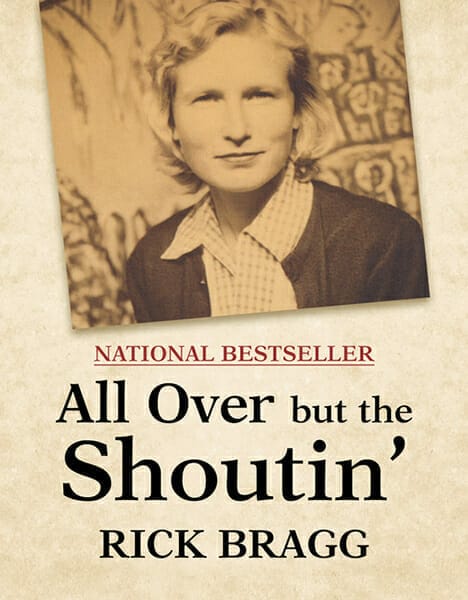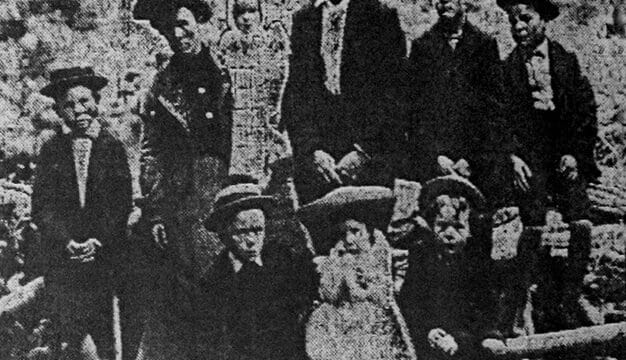Rick Bragg
 Rick Bragg
Rick Bragg (1959- ) is a noted journalist and writer who won the Pulitzer Prize for Feature Writing for his work with the New York Times. His most lasting contribution, however, is likely his trilogy of family stories. Initially, Bragg believed these stories would be important only to himself and his immediate family, but they have garnered wide appeal among people who see themselves and their own families reflected in the characters and settings.
Rick Bragg
Rick Bragg (1959- ) is a noted journalist and writer who won the Pulitzer Prize for Feature Writing for his work with the New York Times. His most lasting contribution, however, is likely his trilogy of family stories. Initially, Bragg believed these stories would be important only to himself and his immediate family, but they have garnered wide appeal among people who see themselves and their own families reflected in the characters and settings.
Rick Bragg was born on July 26, 1959, in Piedmont, Calhoun County, to Charles Bragg and Margaret Marie Bundrum Bragg. His father, a Korean War veteran, was largely absent from the household and died in 1974. His mother supported the family by picking cotton, taking in other people’s laundry, and cleaning houses for the more prosperous families in the area. The Braggs had four sons: Sam, Rick, Mark, and a fourth child who died in infancy. Bragg grew up in and around Possum Trot (near the Jacksonville area).
After graduating from Jacksonville High School in 1977, Bragg took a job and attended night courses for six months at Jacksonville State University. In 1980, he was hired as a reporter for the Anniston Star (his byline also appeared in the Talladega Daily Home and the Jacksonville News, which were also owned by the Star). From 1986 to 1989, he worked as a reporter at the Birmingham News. He left in March 1989 for Florida to work for the St. Petersburg Times as a correspondent. His assignments during those years included coverage of Hurricane Andrew, the political and socio-economic turmoil in Haiti, and the riots in Miami. He was initially hired as a reporter but was promoted to bureau chief before leaving the paper in 1994.
In 1992, Bragg was awarded Harvard University’s Nieman Fellowship, which provides tuition-free career development education for working journalists. In 1994, Bragg was hired as a correspondent for the New York Times. During his tenure at the Times, he lived in and worked in New York, Atlanta, Miami, and New Orleans. In 1996, Bragg received the Pulitzer Prize for Feature Writing for his coverage of the Oklahoma City bombing. Other memorable stories include his coverage of the Susan Smith child murders; the $150,000 bequest to the University of Southern Mississippi by African American washerwoman Oseola McCarty; the death of George Wallace; the Jonesboro, Arkansas, school shootings; and the tornados that destroyed a church near his hometown. Bragg resigned from the New York Times in 2003 after a two-week suspension alleging that he had inappropriately used the research of stringers and interns.
 All Over but the Shoutin’
Bragg published the first in a series of three books about his family, All Over but the Shoutin’, in 1997. It is primarily the story of his mother, Margaret Bragg, a woman who went 18 years without a new dress so that her sons could have school clothes. The memoir earned almost universally excellent reviews and was a New York Times bestseller. Bragg described the work as actually three separate pieces woven together to give a picture of his mother, his childhood, and his career as a journalist. At book signings and other literary events, readers always raised the question of the source of Bragg’s mother’s strength. As a response, he wrote Ava’s Man (2001), which refers to his maternal grandfather, Charlie Bundrum, a man who worked as a roofer, general laborer, and bootlegger during the Great Depression to feed his wife and eight children.
All Over but the Shoutin’
Bragg published the first in a series of three books about his family, All Over but the Shoutin’, in 1997. It is primarily the story of his mother, Margaret Bragg, a woman who went 18 years without a new dress so that her sons could have school clothes. The memoir earned almost universally excellent reviews and was a New York Times bestseller. Bragg described the work as actually three separate pieces woven together to give a picture of his mother, his childhood, and his career as a journalist. At book signings and other literary events, readers always raised the question of the source of Bragg’s mother’s strength. As a response, he wrote Ava’s Man (2001), which refers to his maternal grandfather, Charlie Bundrum, a man who worked as a roofer, general laborer, and bootlegger during the Great Depression to feed his wife and eight children.
In addition to his family trilogy, in 2003 Knopf selected Bragg to write the story of Jessica Lynch, one of the first women to be captured while on active duty in the U.S. military.
Bragg was married to and divorced Lisa Creel in the early 1980s. In May 2005, he married Diane Wells; chapters on the role of fatherhood and his relationship with Wells’s young son provides the counterpoint to chapters on Bragg’s on father in The Prince of Frogtown (2008). The novel completes the cycle of books about Bragg’s family. In it, he grapples with the legacy of his largely absentee father, while at the same time coming to grips with how to help raise the stepson he has acquired in his second marriage. Written in chapters that alternate between his father and his stepson, Bragg reconsiders his father’s life: what it would have been like for a young man to feel trapped in the mill villages of the Deep South, how desperately his father must have wanted to get out, how he was affected by being a Marine during the Korean War, and how alcohol destroyed Charles Bragg’s better nature.
In more recent years, Bragg has published two memoirs, a biography of famed performer Jerry Lee Lewis in 2014, a tribute to his dog in The Speckled Beauty (2021), and Where I Come From: Stories from the Deep South (2020), a collection of his columns in Southern Living magazine.
 Rick Bragg and Jessica Lynch
Currently a professor of writing at the University of Alabama, Bragg teaches courses in literary journalism and magazine writing. Bragg has won more than 50 writing awards in his 20 years of journalism, including the American Society of Newspaper Editors Distinguished Writing Award twice. He was honored with the Harper Lee Award for Alabama’s Distinguished Writer of the Year in 2009.
Rick Bragg and Jessica Lynch
Currently a professor of writing at the University of Alabama, Bragg teaches courses in literary journalism and magazine writing. Bragg has won more than 50 writing awards in his 20 years of journalism, including the American Society of Newspaper Editors Distinguished Writing Award twice. He was honored with the Harper Lee Award for Alabama’s Distinguished Writer of the Year in 2009.
Works by Rick Bragg
All Over but the Shoutin’ (1997)
Somebody Told Me: The Newspaper Stories of Rick Bragg (2000)
Ava’s Man (2001)
I Am a Soldier, Too: The Jessica Lynch Story (2003)
The Prince of Frogtown (2008)
Jerry Lee Lewis: His Own Story (2014)
My Southern Journey: True Stories from the Heart of the South (2015)
The Best Cook in the World: Tales From My Momma’s Table (2018)
Where I Come From: Stories from the Deep South (2020)
The Speckled Beauty (2021)
Additional Resources
Abbe, Elfried. “Rick Bragg on the Art of Storytelling; the Pulizer Prize-winning Reporter Says You Can Find Some of Your Best Material Close to Home,” The Writer, December 2002, p. 22.
Carlton, Bob. “More To Bragg About,” The Birmingham News, May 3, 2008, E1.
Dickey, Christopher. “This One’s for Daddy.” The New York Times Book Review, July 20, 2008, p. 12.
Kingsbury, Pam. “Behind the Book; Rick Bragg Builds Himself a Grandfather,” Library Journal, September 1, 2001.
———. “Review of Ava’s Man.” Library Journal, June 15, 2001, p. 81.
———. “Review of Somebody Told Me: The Newspaper Stories of Rick Bragg,” Library Journal, May 1, 2000, p. 128.
Steinberg, Jacques. “Times Reporter Steps Down Amid Criticism.” New York Times, 5/29/2003, p. 20.
Weldon, Amy. “When Fantasy Meant Survival: Writing, Class, and the Oral Tradition in the Autobiographies of Rick Bragg and Harry Crews.” The Mississippi Quarterly, Winter 1999, p. 89.



